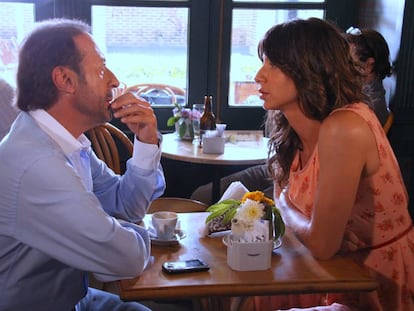Milei's organic cinema against the geeks

Strictly opinion pieces that reflect the author's unique style. These opinion pieces must be based on verified data and be respectful of individuals, even if their actions are criticized. All opinion columns by individuals outside the EL PAÍS editorial team will include, after the last line, a byline—no matter how well-known the author may be—indicating their position, title, political affiliation (if applicable), or main occupation, or any that is or was related to the topic addressed.

I haven't seen Homo Argentum , the film by Mariano Cohn and Gastón Duprat starring superstar Guillermo Francella that's sweeping Argentine theaters this August, but I've seen all of Cohn and Duprat's previous films, with and without their Francella fetish, and so I wasn't surprised by the enthusiasm Javier Milei lavished on this work. Apparently, he screened it at Los Olivos before its premiere and praises it as an example of what Argentine cinema should be. No one can deny that Milei has evolved a lot. He came to the presidency in 2023 without a party, without a discourse, with no ideas other than a chainsaw, and with no intellectual support other than a course in muscular cryptobros . And look at him now: organizing film sessions for the apparatchiki at his dacha and lecturing on politically correct art. Milei is a true Stalin.
I say I'm not surprised by Milei's enthusiasm, because the highly celebrated comedies of Cohn and Duprat divinely express the boorish, vitriolic, simple-minded, envious, mediocre, and self-conscious imagery of the hard core of Milei voters. Perhaps the comedians are quite right to satirize what in some Latin American countries is called the caviar left; in France, they call it bobós (bozos ), and in Spain, until Abascal came along and elongated it into pijoprogre (snobbish progressives), progres (progres). It's easy to nod at the caricature of Nada or the nihilistic resentment of El Gerente (The Caretaker) . They capture the spirit of the times and the popular contempt for certain elites well, but they portray it with such broad, Manichean strokes, and appeal to such a basic audience, that it's hard to separate the corrosive criticism from the fascist-tinged libel. It's these aromas that intoxicate Milei, and no one can blame him for being wrong in perceiving them.
No creator chooses their admirers, and it would be unfair to reproach Cohn and Duprat for Milei being their first apologist, but if the president of a republic (any president of any republic) promotes and celebrates your satire, it's likely that their spirit isn't as satirical as it seems. If the powers that be feel your satire is complacent and useful, it means you're just propagandizing.
In 1905, the Russian people blamed their woes on university intellectuals. They called them ochkastie , which means something like four-eyes. Being nearsighted made you suspect and subject to beatings. To me, Cohn and Duprat's comedies have always seemed anti-four-eyes. To Milei too. We'll have to start wearing contact lenses.
Do you want to add another user to your subscription?
If you continue reading on this device, it will not be possible to read it on the other device.
ArrowIf you want to share your account, upgrade to Premium, so you can add another user. Each user will log in with their own email address, allowing you to personalize your experience with EL PAÍS.
Do you have a business subscription? Click here to purchase more accounts.
If you don't know who's using your account, we recommend changing your password here.
If you decide to continue sharing your account, this message will be displayed indefinitely on your device and the device of the other person using your account, affecting your reading experience. You can view the terms and conditions of the digital subscription here.

He is the author of the essays "Empty Spain" and "Against Empty Spain." He has won the Ojo Crítico and Tigre Juan awards for "The Violet Hour" (2013) and the Espasa award for "Places Out of Place" (2018). His notable novels include "A Certain González" (2022), "The Skin" (2020), and "What Nobody Cares" (2014). His latest book is "The Germans" (Alfaguara Prize, 2024).

EL PAÍS


%3Aformat(jpg)%3Aquality(99)%3Awatermark(f.elconfidencial.com%2Ffile%2Fbae%2Feea%2Ffde%2Fbaeeeafde1b3229287b0c008f7602058.png%2C0%2C275%2C1)%2Ff.elconfidencial.com%2Foriginal%2Fc17%2Fcb2%2F2d5%2Fc17cb22d5c9a6d24bf1077f843bee3ca.jpg&w=1280&q=100)


